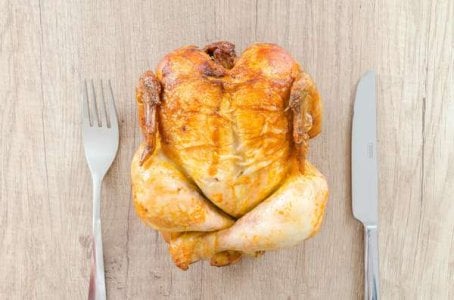Winner winner, chicken dinner? Supermarkets reveal ways to rehash unsold chooks
By
Danielle F.
- Replies 3
The humble roast chicken—affectionately dubbed the 'bachelor's handbag'—is a staple in the Australian diet.
It's the quick and easy solution for a family dinner, a convenient snack for those on the go, and a beloved fixture at sporting events.
Have you ever wondered what happens to those hot, juicy birds that don't find a home by the end of the day?
In an era where the cost of living and food wastage are growing concerns, it's heartening to know that major supermarkets take steps to ensure that unsold food items don't end up in the bin.
Here are some ways major retailers save unsold rotisserie chickens from wasting away.
Coles: A mission to reduce food waste
To combat food wastage, Coles implemented a system that benefits both the community and the environment.
Last financial year, Coles donated nearly 20,000 tonnes of unsold edible items to food rescue organisations like SecondBite and Foodbank.
The donations were equivalent to 39 million meals.
Coles stores reduce the price of their hot roast chickens, increasing the likelihood of them being sold.
Any remaining chickens are then shredded and sold by the kilo in the refrigerated deli section—perfect for sandwiches, tacos, or pasta dishes.
Woolworths: Minimising wastage with popular demand
Woolworths also adhere to strict food safety guidelines to ensure minimal wastage of their hot roast chickens.
By making their chickens available within peak shopping times, Woolworths maximised the chances of their chickens being purchased while still fresh and hot.
Costco: Continuous cooking and blast chilling
Costco, the American wholesale retailer with a presence in Australia, takes a slightly different approach.
Costco continuously cooks its rotisserie chickens to maintain a constant supply of fresh, hot chickens throughout the day.
Chickens nearing the end of their hot shelf life are placed in a blast chiller to cool down quickly.
They are then sold in a refrigerated case at a reduced price.
This process not only ensures quality and safety but also helps to reduce food waste.
So, the next time you're at Coles, Woolworths, or Costco, keep an eye out for discounted roast chickens.
They may not be piping hot off the rotisserie, but they're still delicious at a bargain price.
Not only will you be getting a deal, but you'll also be supporting supermarkets in their efforts to reduce food waste.

Have you ever snagged a bargain on a roast chicken? You may have other tips for making the most of supermarket markdowns. Share your experiences and advice in the comments below.
It's the quick and easy solution for a family dinner, a convenient snack for those on the go, and a beloved fixture at sporting events.
Have you ever wondered what happens to those hot, juicy birds that don't find a home by the end of the day?
In an era where the cost of living and food wastage are growing concerns, it's heartening to know that major supermarkets take steps to ensure that unsold food items don't end up in the bin.
Here are some ways major retailers save unsold rotisserie chickens from wasting away.
Coles: A mission to reduce food waste
To combat food wastage, Coles implemented a system that benefits both the community and the environment.
Last financial year, Coles donated nearly 20,000 tonnes of unsold edible items to food rescue organisations like SecondBite and Foodbank.
The donations were equivalent to 39 million meals.
Coles stores reduce the price of their hot roast chickens, increasing the likelihood of them being sold.
Any remaining chickens are then shredded and sold by the kilo in the refrigerated deli section—perfect for sandwiches, tacos, or pasta dishes.
Woolworths: Minimising wastage with popular demand
Woolworths also adhere to strict food safety guidelines to ensure minimal wastage of their hot roast chickens.
By making their chickens available within peak shopping times, Woolworths maximised the chances of their chickens being purchased while still fresh and hot.
Costco: Continuous cooking and blast chilling
Costco, the American wholesale retailer with a presence in Australia, takes a slightly different approach.
Costco continuously cooks its rotisserie chickens to maintain a constant supply of fresh, hot chickens throughout the day.
Chickens nearing the end of their hot shelf life are placed in a blast chiller to cool down quickly.
They are then sold in a refrigerated case at a reduced price.
This process not only ensures quality and safety but also helps to reduce food waste.
So, the next time you're at Coles, Woolworths, or Costco, keep an eye out for discounted roast chickens.
They may not be piping hot off the rotisserie, but they're still delicious at a bargain price.
Not only will you be getting a deal, but you'll also be supporting supermarkets in their efforts to reduce food waste.
Key Takeaways
- Coles and Woolworths supermarkets repurpose unsold roast chickens to reduce food wastage, which is in line with food safety guidelines.
- Last year, Coles donated unsold edible food to organisations like SecondBite and Foodbank and shredded unsold roast chickens to sell in their deli section.
- Woolworths also ensured their roast chickens's availability during peak shopping times, resulting in minimal wastage.
- Costco Australia implemented a different strategy by continuously cooking chickens throughout the day and chilling unsold chooks to be sold at a reduced price.








